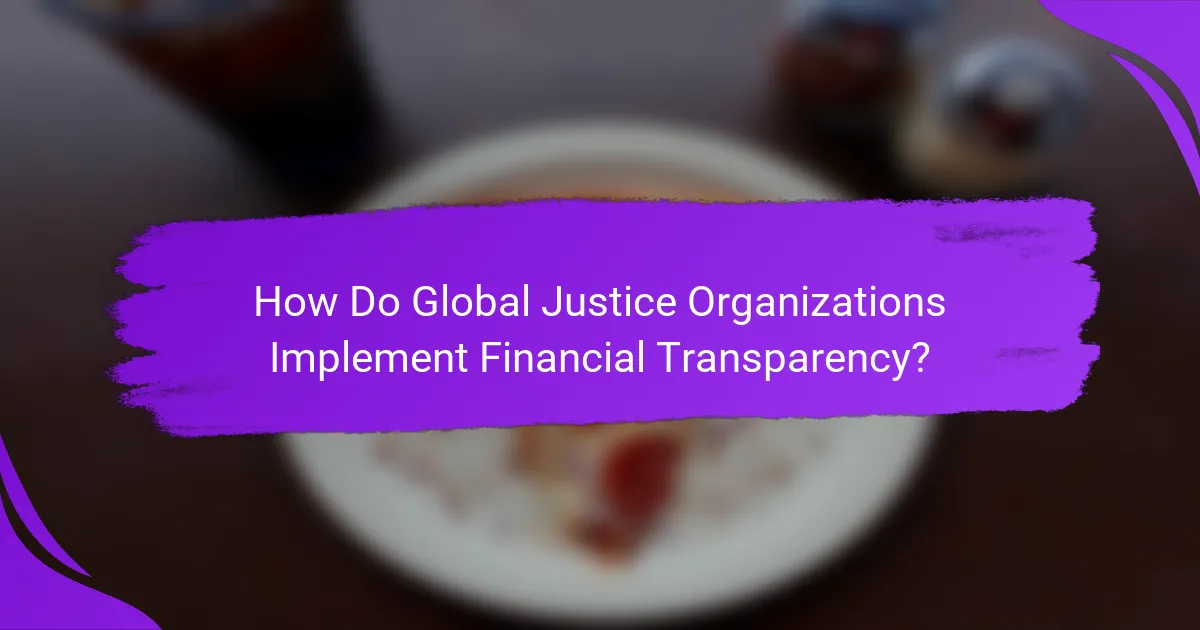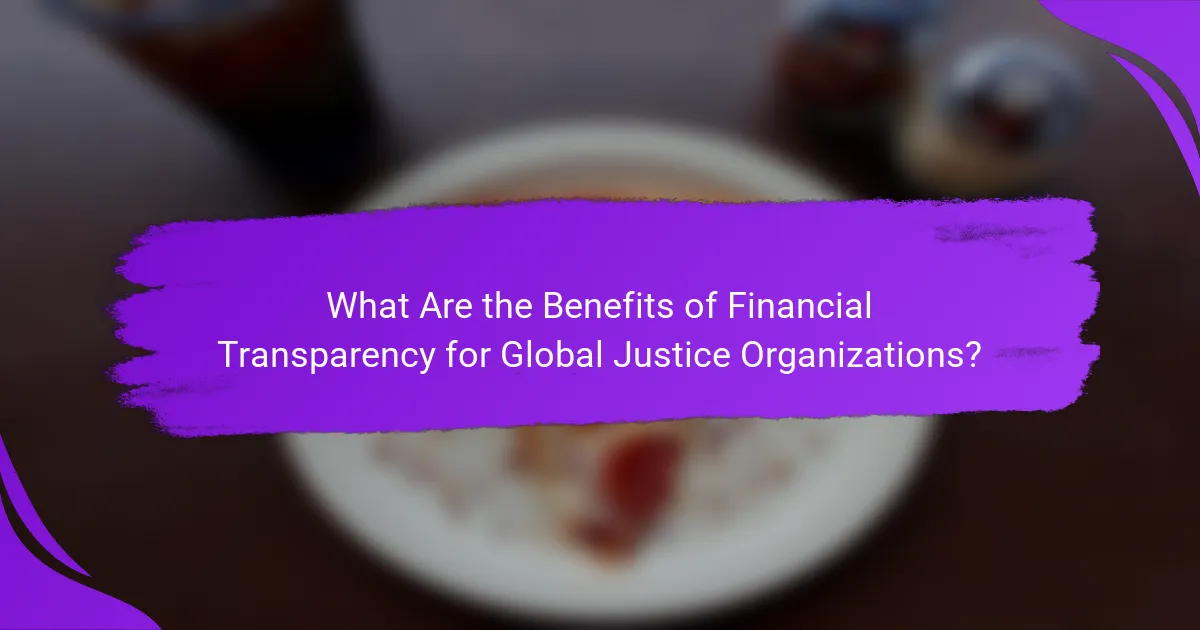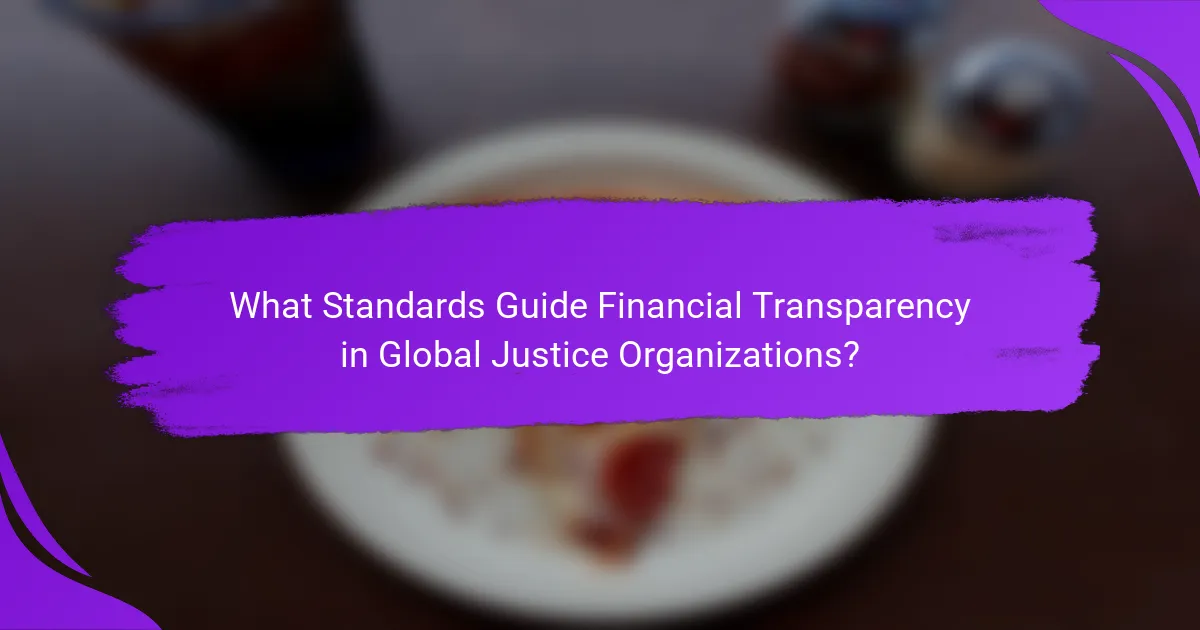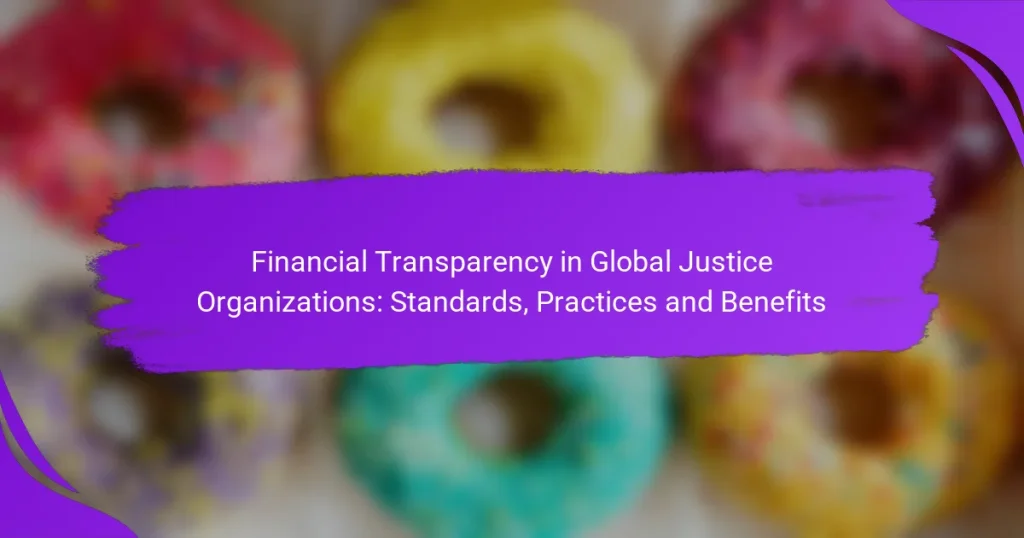Financial transparency is crucial for global justice organizations as it fosters trust and accountability among stakeholders. By adopting best practices such as clear reporting, regular audits, and effective use of technology, these organizations can enhance their credibility and operational efficiency. Ultimately, transparent financial practices not only attract funding but also empower informed decision-making, enabling organizations to better achieve their missions.

What Are the Best Practices for Financial Transparency in Global Justice Organizations?
Best practices for financial transparency in global justice organizations include clear reporting, regular audits, stakeholder engagement, effective use of technology, and compliance with international standards. Implementing these practices fosters trust and accountability, essential for attracting funding and support.
Open financial reporting
Open financial reporting involves sharing detailed financial information with stakeholders, including donors, beneficiaries, and the public. This practice enhances accountability and allows stakeholders to understand how funds are allocated and spent.
Organizations should provide regular updates on income, expenditures, and financial statements, ideally in accessible formats. For example, publishing annual reports and maintaining a dedicated financial section on their website can significantly improve transparency.
Regular audits
Conducting regular audits is crucial for verifying the accuracy of financial records and ensuring compliance with established standards. Independent audits, preferably by certified professionals, help identify discrepancies and promote financial integrity.
Organizations should aim for annual audits, but biannual audits can be beneficial for larger entities or those handling significant funds. Sharing audit results with stakeholders reinforces trust and demonstrates commitment to transparency.
Stakeholder engagement
Engaging stakeholders in financial discussions is vital for fostering a culture of transparency. This can include soliciting feedback on financial practices and involving them in decision-making processes related to budget allocations.
Regular meetings, surveys, and open forums can facilitate this engagement. Organizations should prioritize clear communication and responsiveness to stakeholder concerns to build stronger relationships and enhance accountability.
Use of technology
Leveraging technology can streamline financial reporting and enhance transparency. Tools such as cloud-based accounting software allow for real-time tracking of financial transactions and easy sharing of financial data with stakeholders.
Additionally, utilizing blockchain technology can provide an immutable record of transactions, further increasing trust. Organizations should invest in user-friendly platforms that facilitate transparency while ensuring data security.
Compliance with international standards
Compliance with international financial reporting standards, such as the International Financial Reporting Standards (IFRS) or the Generally Accepted Accounting Principles (GAAP), is essential for global justice organizations. Adhering to these standards ensures consistency and reliability in financial reporting.
Organizations should regularly review their financial practices against these standards and seek guidance from financial experts when necessary. This compliance not only enhances credibility but also aligns organizations with global best practices in financial management.

How Do Global Justice Organizations Implement Financial Transparency?
Global justice organizations implement financial transparency by establishing clear policies, training staff, and utilizing effective financial management software. These practices ensure accountability and build trust with stakeholders, enhancing the organization’s credibility and operational efficiency.
Establishing clear policies
Clear financial policies are essential for guiding the operations of global justice organizations. These policies should outline procedures for budgeting, spending, and reporting, ensuring that all financial activities align with the organization’s mission and values.
Organizations often adopt frameworks such as the International Financial Reporting Standards (IFRS) to maintain consistency and transparency. Regular reviews of these policies help to adapt to changing regulations and stakeholder expectations.
Training staff on transparency
Training staff on financial transparency is crucial for fostering a culture of accountability within global justice organizations. Workshops and seminars can educate employees about the importance of transparency and the specific practices they should follow.
Regular training sessions should cover topics such as ethical financial management, reporting requirements, and the use of financial tools. This empowers staff to make informed decisions and promotes adherence to established policies.
Utilizing financial management software
Financial management software plays a vital role in enhancing transparency for global justice organizations. These tools streamline budgeting, tracking, and reporting processes, making it easier to maintain accurate financial records.
Organizations should consider software options that offer features like real-time reporting, user access controls, and compliance tracking. By leveraging technology, organizations can reduce errors and improve the efficiency of their financial operations.

What Are the Benefits of Financial Transparency for Global Justice Organizations?
Financial transparency offers global justice organizations numerous advantages, including building trust with stakeholders, ensuring accountability, and facilitating informed decision-making. By openly sharing financial information, these organizations can enhance their credibility and effectiveness in achieving their missions.
Increased trust from donors
When global justice organizations practice financial transparency, they foster greater trust among donors. Donors are more likely to contribute when they can see how their funds are being utilized and the impact of their contributions.
Providing detailed financial reports and updates can reassure donors that their investments are being managed responsibly. Organizations can enhance trust by sharing success stories and outcomes linked to specific funding sources.
Enhanced accountability
Financial transparency promotes accountability within global justice organizations by establishing clear expectations for financial management. When organizations disclose their financial practices, they are held responsible for their actions and decisions.
This accountability can lead to better governance and adherence to ethical standards. Organizations can implement regular audits and publish the results to demonstrate their commitment to responsible financial practices.
Improved decision-making
Transparency in financial matters supports improved decision-making by providing leaders with accurate and timely data. When organizations have clear visibility into their financial health, they can make informed choices about resource allocation and strategic planning.
For instance, organizations can identify areas where funding is most effective and adjust their programs accordingly. Regular financial reviews can help in recognizing trends and making proactive adjustments to enhance overall performance.

What Standards Guide Financial Transparency in Global Justice Organizations?
Financial transparency in global justice organizations is guided by several key standards that ensure accountability and trust. These standards help organizations communicate their financial health and operational effectiveness to stakeholders, including donors and beneficiaries.
International Financial Reporting Standards (IFRS)
The International Financial Reporting Standards (IFRS) provide a global framework for financial reporting, ensuring consistency and transparency across organizations. Adopting IFRS helps justice organizations present their financial statements in a way that is understandable and comparable internationally.
Organizations should consider the costs and benefits of implementing IFRS, as it may require significant changes to accounting practices. However, the transparency gained can enhance credibility with international donors and partners.
Charity Navigator guidelines
Charity Navigator offers guidelines that assess the financial health and accountability of nonprofit organizations, including those in the justice sector. These guidelines focus on metrics such as financial efficiency, transparency, and governance practices.
Organizations aiming to improve their rating on Charity Navigator should prioritize clear financial reporting, effective governance structures, and responsible spending practices. Regularly reviewing these guidelines can help organizations maintain high standards and attract more funding.
Global Reporting Initiative (GRI)
The Global Reporting Initiative (GRI) provides a comprehensive framework for sustainability reporting, which includes financial transparency as a key component. GRI standards encourage organizations to disclose their economic, environmental, and social impacts, fostering a holistic view of their operations.
Justice organizations can benefit from adopting GRI standards by enhancing their stakeholder engagement and demonstrating their commitment to accountability. Utilizing GRI can also help organizations identify areas for improvement and align their practices with global sustainability goals.

How Do Financial Transparency Practices Vary by Region?
Financial transparency practices differ significantly across regions, influenced by local regulations, cultural norms, and organizational structures. In some areas, stringent laws mandate detailed financial disclosures, while in others, organizations may operate with minimal oversight.
North America
In North America, particularly the United States and Canada, financial transparency is often governed by strict regulations. Nonprofit organizations must adhere to standards set by the IRS and provincial authorities, requiring detailed annual reports and public disclosures. This ensures accountability and builds trust with donors.
Organizations often utilize platforms like Guidestar or Charity Navigator to showcase their financial health, making it easier for potential donors to assess their transparency. Regular audits are common, reinforcing the commitment to financial integrity.
Europe
European countries exhibit a diverse range of financial transparency practices, influenced by the European Union’s regulations. Many nations require nonprofits to publish annual financial statements, but the level of detail can vary. For instance, Scandinavian countries often lead in transparency, with comprehensive reporting standards.
In contrast, some Eastern European nations may have less stringent requirements, leading to potential gaps in financial oversight. Organizations operating in these regions should consider adopting best practices from more transparent countries to enhance their credibility.
Asia
In Asia, financial transparency practices can vary widely, influenced by local governance and economic conditions. Countries like Japan and South Korea have established frameworks that promote transparency through regulatory requirements and voluntary initiatives. Nonprofits often publish annual reports, but the depth of information may differ.
Conversely, in regions with less regulatory oversight, such as parts of Southeast Asia, organizations may face challenges in maintaining transparency. Implementing self-regulatory measures and engaging with stakeholders can help improve financial practices in these areas.
Africa
African nations often grapple with varying levels of financial transparency, shaped by economic challenges and governance issues. While some countries have made strides in establishing regulations for nonprofit financial reporting, others may lack the infrastructure for effective oversight.
Organizations in Africa can benefit from adopting international best practices, such as the International Financial Reporting Standards (IFRS), to enhance their accountability. Collaborating with local governments and communities can also foster a culture of transparency.
Latin America
In Latin America, financial transparency is increasingly recognized as essential for nonprofit organizations. Many countries have implemented laws requiring financial disclosures, but enforcement can be inconsistent. Countries like Brazil and Chile have made progress in establishing clear reporting guidelines.
Nonprofits should focus on building trust through transparent practices, such as regular financial updates and stakeholder engagement. Utilizing technology to streamline reporting processes can also enhance transparency and accountability.


